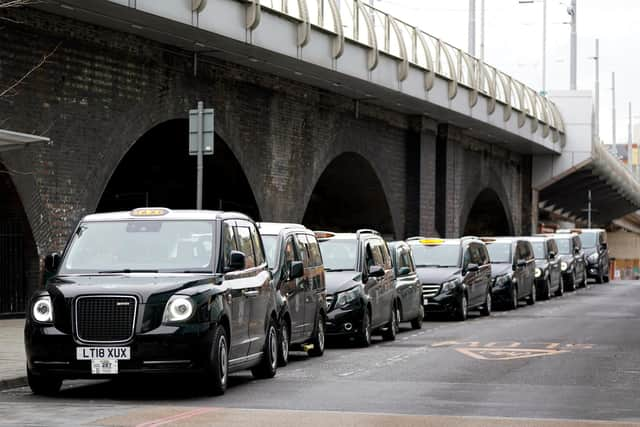Fewer private hire vehicles in Newcastle than before pandemic


Fewer private hire vehicles are transporting passengers through Newcastle's streets than before the coronavirus pandemic, new figures show.
The GMB Union said running taxis and pre-booked cars has become more expensive due to a "perfect storm" of problems, including the cost-of-living crisis, the coronavirus pandemic and licensing issues.
Advertisement
Hide AdAdvertisement
Hide AdA private hire vehicle, such as those available through Uber, must be pre-booked and cannot ply for hire, whereas a taxi, such as a traditional black cab, can be hailed down and is usually charged on a timed meter.
Department for Transport figures show there were 2,174 private hire vehicles in Newcastle as of March – up from 2,008 the year before but below 2,512 in March 2020.
Across England and Wales, the total number of private vehicles increased in the last year following a significant drop in 2021 – though it is still well below the number of vehicles on the roads before the pandemic.
There were 236,000 private hire vehicles in 2020, dropping to 197,000 last year before rebounding to 208,000 this year.
Advertisement
Hide AdAdvertisement
Hide AdYaseen Aslam, president of the App Drivers and Couriers Union, which represents private hire drivers, said: "A lot of people stopped driving during the pandemic as they became couriers and decided it was more cost-effective.
Mr Aslam said low pay sometimes attached to working for a private hire vehicle company is another issue, adding that a cap on the total number of licensed drivers should be introduced to protect against increasingly lower fares.
"When they try and make it unlimited, it is not sustainable," he added.
Meanwhile, the number of taxis nationally has continued to fall every year since 2017, from 80,500 to 62,300 this year – and GMB is concerned about the number of drivers leaving the industry.
Advertisement
Hide AdAdvertisement
Hide AdSteve Garelick, GMB regional organiser, said: "Taxi driving has got more expensive in recent years - and licensing isn't helping to support drivers.
"Whether it is fuel costs, or how expensive electric vehicles are, overheads are a struggle.
"Through the pandemic, many moved into other industries, and only now is demand picking back up fully, and drivers returning."
But the number of taxis in Newcastle has bucked the trend, rising to 599 in the last year but remains below 775 in 2020, before the pandemic.
Advertisement
Hide AdAdvertisement
Hide AdOf the taxis available in March, just 279 were wheelchair accessible, while 15 private hire vehicle offered disabled access.
The figures also show there are now 4,576 licences for taxi and private hire drivers in the area – above 3,425 in 2020.
However, nationally, the number of total licenses has dropped from 376,700 in 2020 to 341,300.
GMB expressed its support for drivers who have left the industry.
Mr Garelick said: "GMB will always stand with drivers for better terms and conditions in their roles."